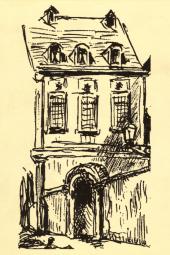Abdelhamid Ibrahim ("Bashi") Sabra, Professor Emeritus of the History of Arabic Science at Harvard University, was born in 1924 to a family of modest means in the Egyptian city of Tanta, Sabra was able to receive an education because he was his parents' only child to survive infancy. After attending the local Coptic school, he won a scholarship to study philosophy at the nascent Alexandria University. There he studied with scholars such as Yusuf Karam and Abu al-'Ala `Afifi. His group of college friends included the later literary critic, poet, and translator, Mohammad Mustafa Badawi, the actor Mahmoud Morsi, and the novelist Edward al-Kharrat. In 1950, the Egyptian government sent him to study at the London School of Economics, where he pursued a doctorate in Philosophy of Science under the supervision of Karl Popper. His dissertation was later published by the Cambridge University Press under the title "Theories Of Light from Descartes To Newton."
In England, he met a fellow student, Nancy Sutton, whom he married in 1955, before returning to Egypt to teach at Alexandria University. In 1962, they decided to leave Egypt and Sabra took up a position at the Warburg Institute in London. Always an admirer of British society, he enjoyed the friendship of scholars such as Popper, Ernst Gombrich, Frances Yates, and D. P. Walker. In 1972, Sabra accepted an offer to join the History of Science Department at Harvard. He taught there until his retirement in 1996, serving one term as department chair. Although he never lost his interest in Early Modern science, Sabra is best known for his contributions to the study of medieval Arabic science. In particular, he was interested in optics and in the work of al-Hasan ibn al-Haytham, whom he regarded as the greatest scientific thinker of the medieval Arabic tradition. He prepared a critical edition of most of Ibn al-Haytham's "Optics" (Kitab al-Manazir), and provided an English translation and commentary.
Towards the end of his career, he focused on the physical theory of Islamic theology (`Ilm al-Kalam), which he regarded as an alternative to the Aristotelian tradition that informed so much pre-modern scientific thinking. In 2005, he was awarded the George Sarton Medal for lifetime achievement by the History of Science Society. He also was awarded a prize by the Kuwait Science Foundation. He is survived by his wife of fifty-eight years, Nancy, and his sons, Adam and Peter.
from Humanities and Social Sciences Online
